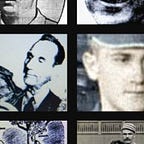A Letter from the Front, 1918
James H. “Jimmy” “Captain” Smith played for three early Chicago-based Negro League teams — the Columbia Giants, the Union Giants, and the Leland Giants — in addition to stints with the Cuban X-Giants and St. Paul Gophers. Already twenty-eight years old, and a Spanish-American War veteran, when he played for the Columbia Giants in 1902, Smith’s career was over by 1909.
In 1918, David Wyatt, a former Union Giants infielder turned sportswriter for The Chicago Defender, said of him:
“Smith was a player who ranked with the very best of his time, and it is extremely doubtful if any of the present-day stars can excel him in efficiency and all-around play. Besides being a classy actor at the hot corner of the diamond, Smith was a natural leader of men. He was captain of the Leland Giants of the season of 1905; under his guiding hand that team made a run of forty-seven consecutive wins; a record not surpassed or even equaled in the annuals of history of Colored baseball.”
Smith went to work for the post office after his retirement and rose to the rank of captain in the Eighth Illinois National Guard, a unit composed of black soldiers from the near South Side neighborhood then known as the Black Belt — now Bronzeville. When the United States entered World War I, the eighth entered active duty as the 370th Infantry.
In April of 1918, the 370th arrived in France. In August, Smith provided readers of The Defender with an update on the activities of the unit in a letter to Wyatt:
“Friend Davy: Your letter reached me today, and to say I was glad to receive it, would be putting it mild indeed; it brought with it memories of the past and I could again see the old bunch — the first ‘Leland Giants,’ season in 1905 — cavorting around at 79th and Wentworth, and making all the good teams sit up and wonder how it happened — a great bunch to think about (George) Taylor, (Nate) Harris in a class by themselves; peerless (William) Binga, that mighty outfield(Sherman) Barton, (Joe) Green, and (Dell) Mathews.”
[…]
“Then along comes the American Giants, Say, boy, it is great to read about them. Well, the old 8th had a team while training in Texas and we cleaned up everything in the division; played two games with the (Houston) Black Buffalos and split even; lost the first 5–3, won the second 3–1. This by the way, was our only losing game. We have not played any since arriving overseas, as we have been on the go ever since landing.”
Besides Smith, the unit’s team in Texas included at least two other Negro League players: Harry Bauchman and Lemuel McDougal.
Smith then turned his attention towards the war:
“The censorship is too strict to permit of sending of much news; will save it up for you until I return. We have been in the front line trenches and the boys stood it well. We are lulled to sleep at night by the roar of the big guns; have witnessed several big air-fights and see them shooting at machines every day; it is exciting, wonderful, and quite a thrilling spectacle to behold. Now and then we sit in our dug-outs underground and try to imagine we are at 35th and State Streets, or the American Giants’ park….This is a very beautiful country, the people are in a class by themselves, that is as far a politeness goes, and many other respects. It is a shame the way the towns have been bowled over by the Huns — ruins, ruins everywhere you look and then more ruins; it will take years to repair the damage.”
[…]
“All the boys join me in sending regards to all friends, fans, ballplayers and the people at large. Tell them we are over here to do our bit for democracy. We intend to get results, and will not stop short of the winning goal.”
According to the book, “History of the American Negro in the Great World War,” by William Allison Sweeney:
“(On November 7) Company C, of the 370th, under the command of Captain James H. Smith, a Chicago letter carrier, signally distinguished itself by storming and taking the town of Baume and capturing three pieces of field artillery (and two machine guns).”
As a result of their actions, Company C earned the French Croix de Guerre.
Smith returned to Chicago where he continued to work for the post office, occasionally wrote baseball articles for The Defender, and rose to the rank of Colonel in the Illinois National Guard. He died on Christmas Eve in 1960 at a veteran’s hospital near his second home in Michigan.
